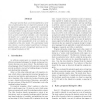Free Online Productivity Tools
i2Speak
i2Symbol
i2OCR
iTex2Img
iWeb2Print
iWeb2Shot
i2Type
iPdf2Split
iPdf2Merge
i2Bopomofo
i2Arabic
i2Style
i2Image
i2PDF
iLatex2Rtf
Sci2ools
108
click to vote
ICSE
2007
IEEE-ACM
2007
IEEE-ACM
Kato: A Program Slicing Tool for Declarative Specifications
This paper presents Kato, a tool that implements a novel class of optimizations that are inspired by program slicing for imperative languages but are applicable to analyzable declarative languages, such as Alloy. Kato implements a novel algorithm for slicing declarative models written in Alloy and leverages its relational engine KodKod for analysis. Given an Alloy model, Kato identifies a slice representing the model's core: a satisfying instance for the core can systematically be extended into a satisfying instance for the entire model, while unsatisfiability of the core implies unsatisfiability of the entire model. The experimental results show that for a variety of subject models Kato's slicing algorithm enables an order of magnitude speed-up over Alloy's default translation to SAT.
Related Content
| Added | 09 Dec 2009 |
| Updated | 09 Dec 2009 |
| Type | Conference |
| Year | 2007 |
| Where | ICSE |
| Authors | Engin Uzuncaova, Sarfraz Khurshid |
Comments (0)

